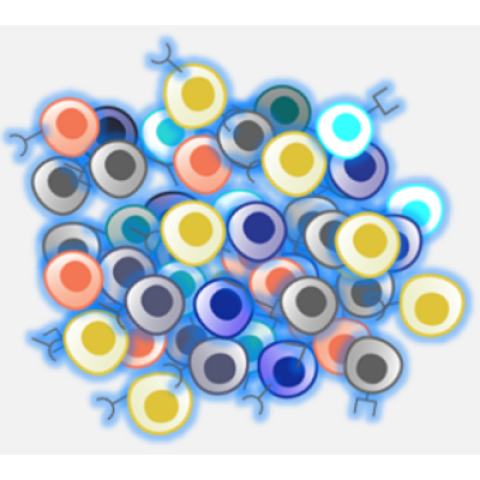
Illustration of the drug Viralym-M (ALVR105), designed to target viral diseases that result in significant morbidity and mortality following allogeneic hematopoietic cell transplant.
Image credit: AlloVir
Children and adults with virus-associated hemorrhagic cystitis following hematopoietic cell transplant may be eligible to participate in a clinical trial at the NIH Clinical Center.
Jennifer A. Kanakry, M.D., Associate Research Physician in the Experimental Transplantation and Immunotherapy Branch, is leading CCR’s participation in a study of a drug that targets six viruses (including BK virus) that can cause infection in people who have had a hematopoietic cell transplant (HCT). HCT, a cancer treatment, replaces a patient’s bone marrow with bone marrow from a healthy donor. After HCT, patients must take medicines that stop their bodies from rejecting the transplanted cells. These medicines weaken the immune system, leaving patients at higher risk for infection, especially from BK virus. BK does not cause a problem for most people after the initial infection, but when the immune system isn’t working well, the virus can cause symptoms of infection, most commonly hemorrhagic cystitis (HC), or bloody urine and painful urination. Viralym-M targets six viruses. However, in this study researchers are most interested in Viralym-M’s ability to clear the symptoms of HC faster than a placebo and evaluating Viralym-M’s effect on five other viruses.
Clinicaltrials.gov identifier: NCT04390113
NCI Protocol ID: NCI-00-0-021
Official Title: Phase 3 Multicenter, Double-Blind, Placebo-Controlled Trial of Viralym-M (ALVR105) for the Treatment of Patients With Virus-Associated Hemorrhagic Cystitis After Allogeneic Hematopoietic Cell Transplant (HCT)
The Center for Cancer Research is NCI’s internal cancer center, a publicly funded organization working to improve the lives of cancer patients by solving important, challenging and neglected problems in cancer research and patient care. Highly trained physician-scientists develop and carry out clinical trials to create the medicines of tomorrow treating patients at the world’s largest dedicated research hospital on the campus of the National Institutes of Health in Bethesda, Maryland.
For more information on CCR clinical trials click here, and subscribe to have the latest CCR clinical trials sent directly to your inbox.